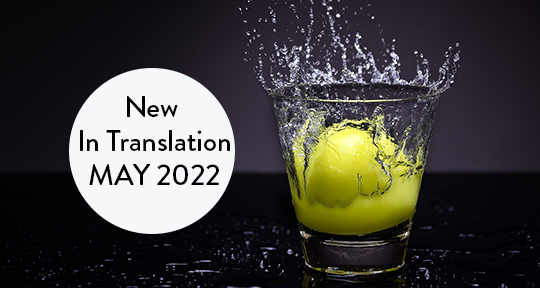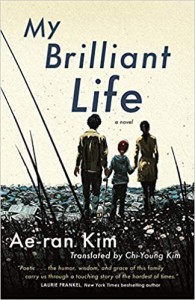In this month of new releases from literatures around the world, we present a poignant and transcendental collection of poems from Palestinian writer Maya Abun Al-Hayyat, a mesmerizing journey through Latin American from Croatian author Marko Pogačar, and a stunning psychological novel of detachment from Erica Mou, in her Anglophone debut. Read on to find out more!

You Can Be the Last Leaf: Selected Poems by Maya Abu Al-Hayyat, translated from the Arabic by Fady Joudah, Milkweed Editions, 2022
Review by Laurel Taylor, Assistant Managing Editor
To raise one’s pen is a political act. As I write these words, it’s been less than forty-eight hours since journalist Shireen Abu Akleh was fatally shot in Jenin. Having acted politically, having written politically, her death is now being used for political means. Words within and about war function as powerful political weapons, bandages, sirens, and songs, all in one. This is what Maya Abu Al-Hayyat shares with us through her incisive verse, as translated from the Arabic by Fady Joudah.
Lovers Swap Language
the way enemies exchanges stabs:
he takes a word from her lexicon
and she takes one from his book.
That’s how poems are made
and also bigoted speechesAnd when lovers and enemies sleep,
the ether carries a hot hum
the universe digests
unaffected.
Words weaponize, the world marches on, but Abu Al-Hayyat rests between breaths, demonstrating through a brilliant puzzle of verbal turns the ways in which trauma has distorted our time. This collection, You Can Be the Last Leaf, brings together verses from multiple times and tomes, holding them in conversation, exchanging the writer’s lexicons and books through the years, and digesting the whole in the face of an indifferent universe.
In his brilliant introduction, Joudah describes Abu Al-Hayyat’s place both as an individual soul but also as someone writing to the collective trauma of the Palestinian people. “The multifarious Palestinian voice lives on in Maya Abu Al-Hayyat’s words, ordinary as grief and daily as laughter.” In the vein of the kitchen table, many of her poems do indeed touch on the quotidian, the life of motherhood and of aging, of love and family. “Mothers Arrange Their Aches at Night,” for example, opens “Joint pain, high sugar, / rheumatic ailments, / a boy who missed school because of a cold”. Quickly, however, the shade of the larger region—of that political conflict—ghosts over the next lines. “mothers feel sadness for mysterious reasons, / like sadness over other mothers / who stand in public streets / holding photos of their sons’ / well-groomed faces / with sideburns and mustaches, / waiting for the camera to capture them / and their chapped hands.” Like Abu Akleh’s reporting, Abu Al-Hayyat’s verse is a camera, and what it captures, what it turns toward, is not only the violence but also the aftermath, the void left by time cut short.
In “Mahmoud,” for example, Abu Al-Hayyat imagines a different future for herself and her lover, who was killed by a bullet from Israeli forces on the first day of the second intifada, as Joudah tells us in his introduction. The poem opens in the hypothetical. “Mahmoud could have been our son. / I’d have objected to the name / and, for family reasons, you’d have insisted on it.” Midway through the poem though, other temporal modes wriggle in. “You’d have forgiven him, / you’re kind like that. He’d only smoked in secret. / But the first rock he’d have thrown / at soldiers at the checkpoint, / to raise his heroic stock in Mana’s eyes, / would have declared war in our house / biting followed by flying slippers.” Mahmoud is forgiven in another timeline, but the lover is kind even now. Mahmoud smoked, but he only hypothetically threw the rock. The poem ends with a slap, the same slap which never landed on Mahmoud’s cheek. READ MORE…




